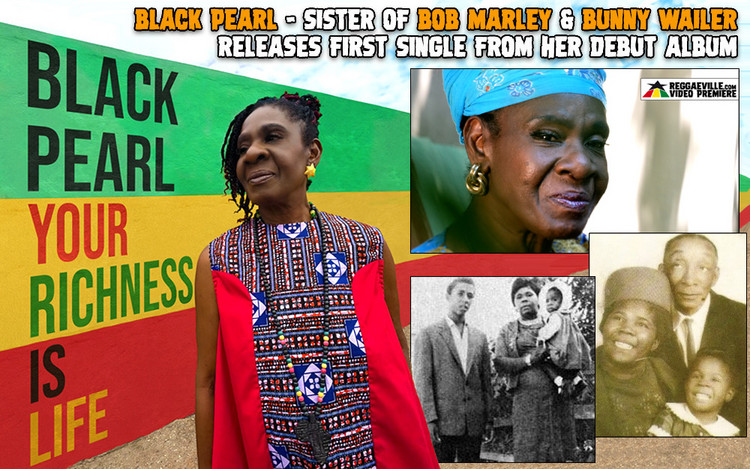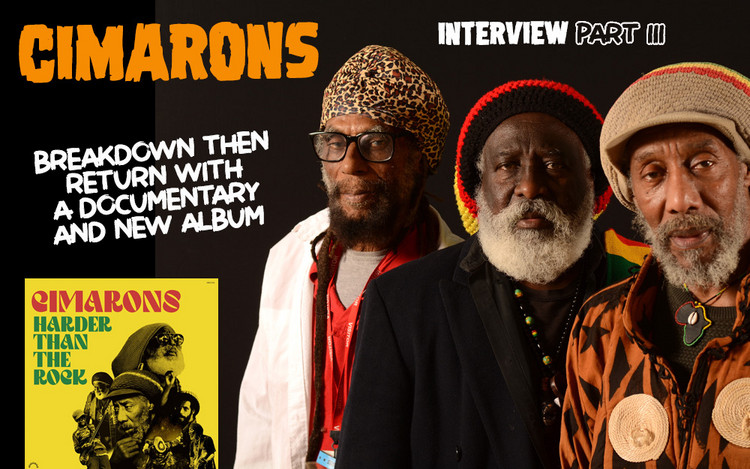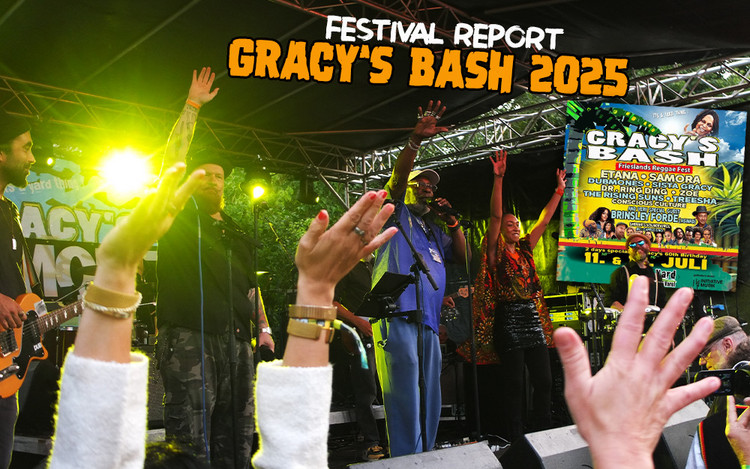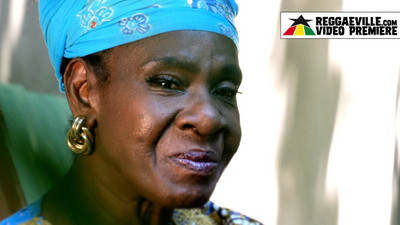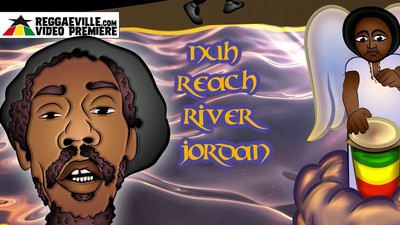Rocky Dawuni ADD
Interview with Rocky Dawuni
04/27/2015 by Justine Amadori Ketola
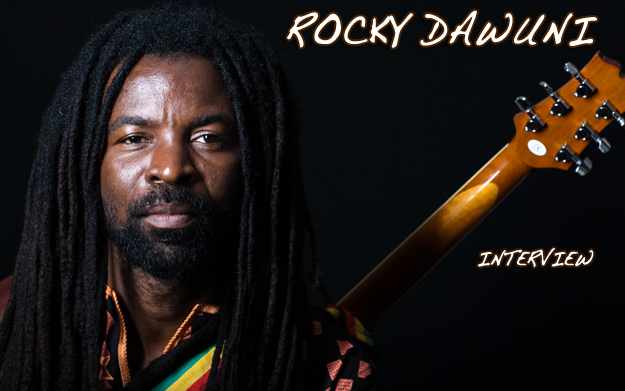
Ghana’s Rocky Dawuni is an artist who has worked tirelessly for the past two decades both to build a great musical catalog and to advocate for others. Reggaeville linked with Rocky to discuss his sixth album and his humanitarian activism. The album Branches Of The Same Tree straddles the musical boundaries between Africa, the Caribbean and the U.S. to create an appealing "Afro-Roots" sound that unites generations and cultures. Dawuni created an album that reflects the origins of Afrobeat with its American musical influences like Funk mixing it with Hi-Life and roots reggae and fusing this inspiring music with compassionate messages that illustrate we are all “branches of the same tree”.
Rocky, its great to connect with you, how has it been going with the new release and your work to promote it?
Its been so amazing we’ve been busy with the launch of the record. Just today we were KCRW (Los Angeles) top tune of the day so KCRW did a big huge push for it and the media and reviews have been really really fantastic on the album and its definitely a very great time for reggae music all around and also just conscious music all around. The album just started receiving very mainstream media attention also not only attention in terms of the content of the message but also the challenges that the record is always going to put in terms of challenging boundaries of other contemporary styles of music and bringing it all together its great to see that mainstream media catching on to that.
You are part of event with the Grammy Museum can you explain more about what it is?
The Grammy Museum organized a very big concert in association with Robert F. Kennedy Center For Human Rights, The concert is called, “The Concert for Social Justice” held at the Honda Theater and I have been very privileged to be invited pretty much as the lone World music artist to join rock legends like David Crosby, Melissa Etheridge, Tom Morello from Rage Against the Machine, Stephen Stills, Jackson Brown, La Santa Cecilia. Basically for me its really an honor too in terms of the very mainstream platforms having the opportunity to do go there and do a a concert that represents consciousness. And everybody knows that reggae music has always been music that has championed consciousness and also addressed the issues of the dispossessed of the world for a long time, and so its really an honor to have that represented on this very incredible stage and I’m also very honored to be called forth to be the artist that comes to represents going to be really a night of empowerment, elevation of consciousness and to really make a statement that we all are in this together, it does not matter genre it does not matter where you come from it doesn’t matter who you are, this is really in line with the philosophy of my new album, Branches Of The Same Tree In that, when we all come together and recognize the certain common roots, we are more powerful than our disparate parts. The sum of our parts is really powerful that is also the spirit in which this concert is going to be these rock music artists are going to collaborate with African music artists and we are all going to together, project this message across.
It’s also the changing tide in the world. You cannot refuse and you cannot ignore the rising tide of consciousness that is going on. As Rastas have always said, the thing is its light you know, once light really amplifies, darkness just retreats. I feel that the forces of togetherness, the forces of oneness, the forces of peace at the same time when there’s so much darkness in the world in terms of all the wars that are going on, in Kenya, this merciless slaughtering of people all this constant forces of war in Israel, in Iran, Ukraine and all these forces of war and at the same time all these forces of peace are also rising and I feel that is going to permeate every fabric of our social structure and Rastaman has to be up front in this charge because Rastaman has always represented that but Rastaman in a new way because where we find the Rasta it is not necessarily with dreadlocks, those with the heart. This is the time, for real.
The song African Thriller was recorded in Ghana, can you discuss the inspiration for this, obviously in part Fela and Afro-Beat but how you wrote it and set out to record in Ghana? 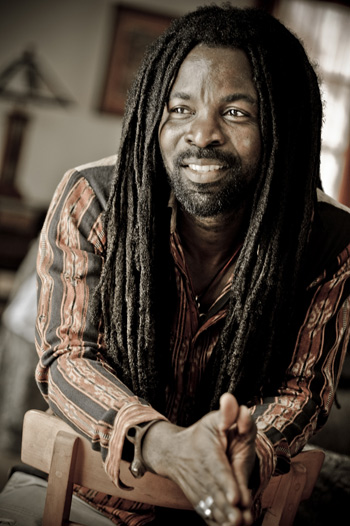 First of all the concept of African Thriller was to really accent cross-cultural collaborations so it was also a song that was steeped in traditional folk music to Hi-Life to Afro-beat at the same time too with the concept of advanced or reinvented reggae track so the original sessions I started in Ghana with some of the best musician friends of mine from Osei Tutu whose really a legendary hornsman, he’s played with all the major major Ghanain artists and has also been a great great arranger of horn lines. So he worked on that and you know CC Frank the drummer, CC has worked with Fela and everybody. Once I started with that first session then I brought it to Los Angeles and also did some overdubs with Dean Gant. Dean Gant has worked with Anita Baker and Outkast and all these amazing people. So Dean Gant worked on it and added certain aspects to it and once it was done I had Jeremy Sole to come in there and really bring the DJ and also the dance dimension to it and in the long run we created a track that was a cross-collaboration of different people in different continents but at the same time too, a song that was very global in its nature because it represents renewal and resilience and power of Africa but at the same time not Africa as everybody projects it but Africa as really the root of all and Africa as a place too that is the foundation of all and I think sonically we were able to achieve that and that song has been very very, very popular song so far.
First of all the concept of African Thriller was to really accent cross-cultural collaborations so it was also a song that was steeped in traditional folk music to Hi-Life to Afro-beat at the same time too with the concept of advanced or reinvented reggae track so the original sessions I started in Ghana with some of the best musician friends of mine from Osei Tutu whose really a legendary hornsman, he’s played with all the major major Ghanain artists and has also been a great great arranger of horn lines. So he worked on that and you know CC Frank the drummer, CC has worked with Fela and everybody. Once I started with that first session then I brought it to Los Angeles and also did some overdubs with Dean Gant. Dean Gant has worked with Anita Baker and Outkast and all these amazing people. So Dean Gant worked on it and added certain aspects to it and once it was done I had Jeremy Sole to come in there and really bring the DJ and also the dance dimension to it and in the long run we created a track that was a cross-collaboration of different people in different continents but at the same time too, a song that was very global in its nature because it represents renewal and resilience and power of Africa but at the same time not Africa as everybody projects it but Africa as really the root of all and Africa as a place too that is the foundation of all and I think sonically we were able to achieve that and that song has been very very, very popular song so far.
You also made a beautiful video with a boxing theme to it which was released some months back, how did this theme come about, was it filmed in Los Angeles? How did you pull this together, its a beautiful piece.
I will give all the credit to our visionary director Glen Wilson. Glen Wilson worked with me on my previous album, he did the African Reggae Fever video really incredible guy and visionary. He saw African Thriller in so many ways also to harken to one of the biggest events that happened in recent history in Africa which was the Muhammed Ali-George Foreman African Thriller in Zaire. Although I was pretty much a little kid at that time we didn’t even know what was going on but we felt that the song also represented and needed to capture those type of energies so the boxing theme came in, but at the same time, the boxing theme provided a place where you can really do cross cultural expression through dance through battling through dancing, so its more using metaphors of violence at the same time to show metaphors of oneness and expression. It was choreographed by Carrie Mac a really really amazing choreographer who worked on that too and did the choreography and then great dancers too who were all part of our tribe from Afro Funke (weekly club event hosted by Rocky in Los Angeles). It was really a collaborative community effort to create that piece. I look back at it and I’m like well you know that was really a piece for the times because its just beautiful in every aspect because its really vibrant and I’m very very proud of the video. The video has been doing fantastic, right when it was released it was launched by Entertainment Weekly and right now you know the video is on all the major channels from MTV to VH1 and all those picked up on the video.
The song Black Star is really influenced by Marcus Garvey with its message taken from Garvey’s speeches, ‘Africa awaits his creators…’ There are variety of causes for the regional conflicts, certainly after what’s happened in Kenya, Boku Harum in Nigeria, the DRC, South Sudan, Al-Shabab in Somalia and beyond. You are joined by Ghana’s Samini here, it was really your own statement about the situation in Africa.
The thing is that the song Black Star, I feel that every important message always needs an interpretation for its generation and its time so the message of Garvey is as vibrant today but the thing is that its almost a slingshot from history it comes cyclically into another generation slings it right into the future again. I felt this song was a galvanizing song not only to bring Africans together but also the Africans in the Diaspora. In a time too when the continent seems like there is so many different conflicts and issues you just gotta turn around and face an issue to deal with. But the only solution can come if Africans themselves rise up to really take control of their own destiny and become masters of their own destiny and work together and focus on these issues and solve them. So togetherness too was also the theme for me when I looked around you know, people in Ghana have said, ‘Oh wow you’ve got to help some of your brothers back at home and bring some of those voices to in terms of your music’. So the collaboration I decided to do with a Ghanaian artist too you know who works in the Dancehall style and is also a friend of mine, Samini I felt was the right voice for this song and we’ve collaborated at home on so many things so he was perfect for it. He had come to Los Angeles and I brought him into the studio to cut his version and it just worked perfectly for this song. But in the long run the song - its ultimate aim is to bring generations, styles and all different dimensions of the African expression out there and to know that right now is the time that we can really rise up and become the best of who we are. But not only the best of who we are, in order for us to lord over other people but the best of who we are for the sake of all humanity because Africa is really the roots and the foundations of every aspect of when you look at the world both from music to culture to the human tree itself, the DNA of the human tree can find its roots to Africa. So if the world does not really work on strengthening its roots, no matter how big the tree grows and we grew to only ensure that one day that big tree will fall. So its in the interest of the whole world to work in partnership with Africa for Africa to strengthen and Africa to also rise up in terms of its economic ability to develop its own resources but in partnership with good partners who will all help benefit everybody and in doing so move into the future so this is a song a rallying call ‘Africa awaits its creators’ are us, we the generation and we are the reflection and the fulfillment of Garvey’s dream. Garvey’s dream in this time, Garvey’s dream in this era and we are all black stars.
You’ve just said something that is a great segue to this question as far as the roots and the branches for the song Children of Abraham. For Children of Abraham you channeled a great roots vibe for the reggae chorus, along with Ronnie “Stepper” McQueen and Rock Deadlock on the drum and bass. Discussing the common Abrahamic origins for religion is a very useful exercise, you mention this was inspired by a trip to Israel and Palestine. Can you discuss what this trip was and your work in cross-cultural understanding as part of your interest in peace and justice issues?
Growing up in my origins from Ghana, we’ve always had Muslim, Christian, Traditional all mixed up, there’s never been a way where we saw differences, we just saw humanity good people and not good people. I had the opportunity of being invited to Israel, to travel there and play with a very famous artist Moshe Ben-Ari. One night I was at a hotel and a Palestinian gentleman came across to me and said ‘I was reading a bit of stuff about you, he said you are that musician right?’ I said ‘Yes’. He was like, ‘Well you speak very well but it looks like you are here only focusing on the Jewish side of the story, have you taken the time to really go to Palestine and see what’s going on?’ And I said, ‘No, I haven’t had the opportunity.’ Lo and behold the following day, the opportunity came for us to get into Palestine but we didn’t have the passes so we were kind of one way or the other, smuggled into Jenin. I had the opportunity of going to a school there that was established by a really famous Israeli actor and it was also to teach Palestinian kids theater and you know really bring light into a place, it was very hard to find something to cheer about. Coupled with all the trips that I had taken to Israel visiting the churches, praying in the churches, praying in the mosques, the Wailing Wall and seeing all of these Abrahamic faiths all together as one at this nucleus. But once you move away from it then there is all the division that once you mix that with the vitriol of politics, then it really becomes this great conflagration where something with a beautiful message and a beautiful heritage that is supposed to bring humanity together is duo fold in dividing humanity. So walking through Israel to Palestine and the churches and mosques and synagogues, this song really started resonating with me. When I came back I gathered my great friends, Ronnie McQueen from Steel Pulse on bass, Rock Deadrick who has played for everybody from Ziggy Marley to Ben Harper and brought these amazing musicians together and recorded this track, and I feel this track is a track that makes us all recognize the Abrahamic roots of all these major religions that right now, threatening to really obliterate each other. By the same time, we are all aspiring to the same Father, the same God to let us see, to take a step back and not focus on the differences but really focus on the commonalities that makes us all true children of God in our diversity and in our differences. So its a song of unity a song of oneness a song that we all belong to each other a song of peace and enduring message to all mankind.
Its a great message to the intra-religious fighting in Africa as well….and the love of reggae there is sure to give it life. Can you comment on the popularity of reggae in Africa?
The thing is that Reggae music always pointed to Africa. The African theme in reggae is ubiquitous, you hear it in everything. When Bob Marley talks about “Jump Nyabinghi” everybody doesn’t know that the origins of the Nyabinghi is from Rwanda, its a spirituality of Rwanda. And African deity an African energy that is Nyabinghi. This whole story became also the foundations of Rasta music. So everything that Rasta has represented from the drums is all steeped in traditional African music, you see. When you look even beyond that, Rasta right now if you want to look at Rasta and then dreadlocks, you can even find it in the Shaivite culture in India. They wear dreadlocks and they smoke the chillum. The concept of Rastafarianism and reggae has always had resonance with Africans, and growing up reggae music was every where you turned. Dancehall… whatever happens in Jamaica, blows back because Africans can really connect to the foundations, because its the same African brothers, the same DNA, same energy who are in other places. So whenever they do something we can on the most basic DNA level we can connect with that. Reggae music has always been a very popular musical form in Africa and it continues to grow in terms of all its variants. What we are doing right now is really expressing reggae music in what we feel its really one of its beautiful forms by infusing African music, coming from the spectacles of Africa. So that’s what Branches Of The Same Tree and a lot of the songs and styles are now is fusing an African-ized version of reggae music and bringing that right now to the rest of the world.
For the Sign, you engage with a different set of musicians to get that neo-soul Afrobeat sound. Mark Sims on the six string bass, these type of players, it is just a full analog style sound….what inspires you to collaborate with specific musicians, is it part of your writing process, in terms of calling on the vast wealth of great musicians, your friends and partners in the LA scene? How does your vision get to tape? Through jamming?
Well my songs always start from the inspiration and then the guitar, and then once it gets on to the guitar, the song is really formulated and created and then once it starts being created, I always one way or the other, visualize and see what rhythmic construction could be in order really give it what its direction is. The Sign is a song that I felt you know…its a song about personal journey and personal discovery and also everybody really submitting to their own path. I felt that it needed really a very rootsy vibe. By the same side rootsy vibe in a much more global sense. Once I started thinking about that, I really started figuring out the eco-system of my great friends Manas Itiene, the drummer he’s also the drummer for Michael Franti. Manas jumped on drums and Leon Mobley who is the percussionist for Ben Harper and the Innocent Criminals on percussion you know Mark Sims who was one of the original bassists for Innocent Criminals and plays with everybody. Mark Sims with his funk and reggae to bring that in and then John McKnight with his amazing keyboards and experiences playing with everybody and also Ben Harper. So I just brought together a collaboration of African musicians who have had exposure to the Western styles and also African-American musicians too who have had experiences of African styles and then global musicians. So it was all kind of taking things from the different directions from the Diaspora perspective and also from the African perspective of fusion and bringing it all to create a song that I feel also takes Neo-Soul and Afro-Beat and Hi-Life and Funk by the same time gives you that rootsy beautiful vibe to create a song, an anthemic song about self-discovery and self-realization.
When and how did you unearth the unreleased Bob Marley song Butterfly?
Laughs….well you know, throughout my career as a musician I have in so many terms been approached by people one way or the other to work on some Bob Marley tracks that were pretty much demos. Its just like jammed demos and I’ve been asked of my interest to complete them or take them and make them into songs. Its been something that I pretty much said, ‘No, its not my place to do that.’ And focus on my career, so this track in particular I remember was one of those tracks that was sent to me and I just checked it out and it was really a very lo-fi kind of strumming on guitar and in terms of the choruses, were not, as I put it, I really reconstructed the chorus. There was something that stuck with me about the innocence and simplicity of the song because it pretty much is one verse that kept being repeated. Cause Bob I think was going over and over the song and the song was a very good representation of American soul at that time cause the chords were a representation, I remember a song that came to my mind a song called, “Tammy” an old soul song, which looks like it was the inspiration for it. It caught my ear, when I was doing the record I really felt like, ‘Wow OK maybe it would be great to just take the song and do the orchestration around it.’ But then my vision was not to do it in terms of how reggae songs are but to also use it to pay homage to the way reggae has become global now, kind of the Hawaiian sound and also the sound you find now in terms of American reggae, global reggae. As bands like SOJA, Gentleman, this global reggae palate, the ukulele and strings that way kind of my way of taking this kind of obscure song and giving it that global palate. I kind of really did the production in that direction and it came out really beautifully.
It along with the Afro Beat version of “Get Up Stand Up” are great tributes Marley how did idea come to you to do this great version and also sung partly in West African Pidgin language? 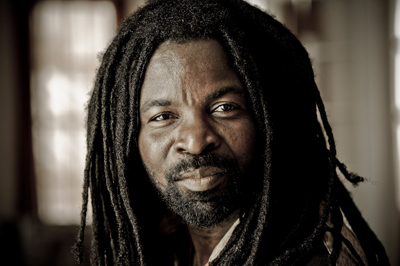 The thing is that I have always felt, as I said earlier, we are all you know from Garvey, Marley, I love Marley’s words and his vision, when taken from Garvey, Haile Selassie and he expressed it in a musical form and then pass that on to a new generation. In this new current generation who are also expressing the same music, I feel that there is always the need to refresh the message, for the current generation. So I felt a song like “Get Up Stand Up” which was actually written only by Bob Marley and Peter Tosh, two of the most amazingly dynamic reggae artists period. Also all of them representing, one being very overtly militant and one being overtly diplomatic, coming together and creating this masterpiece and this masterpiece too of people rising up and realizing their own rights. Right now what’s going on in the world with all the Occupy movements, the citizens really trying, there is the internet we can feel our own personal power and how do we express it. All these kind of crossroads stuff that is going on in the world, people questioning, democratic movements, people questioning in terms of power and how leaders work and reconstructing the paradigm, I felt there was the need for Get Up Stand Up to be revitalized for a new time. But not revitalized by just a simple remake of the song, I saw it more to just express it from where I’m coming from as an Africa. So the language first of all, I changed it to African Pidgin, at the same time too because I come from an Afro-funk, Afro-beat out there West African foundations too. I decided that since this has always been played as a reggae song, I also wanted to bring it from that dimension. For that song, Bob Marley and Peter Tosh were really influenced by WAR, the band called WAR their song “Slipping Into Darkness”. So the riff for “Get Up Stand Up comes from “Slipping Into Darkness” the keyboard riff, Bob and Peter took that riff and added words to it, and created it. So when I was making it I really wanted to draw attention to bands like WAR who use Funk and World music to create global styles. I accented the elements of WAR’s riff, very key part of the song. I have to say Branches Of The Same Tree, to even showcase the branches of the same tree, Bob and Peter, we are also picking form classic stuff that was happening and really recreating it and revitalizing it for a time. In the long run it’s all part of the same wonderful, big musical tree.
The thing is that I have always felt, as I said earlier, we are all you know from Garvey, Marley, I love Marley’s words and his vision, when taken from Garvey, Haile Selassie and he expressed it in a musical form and then pass that on to a new generation. In this new current generation who are also expressing the same music, I feel that there is always the need to refresh the message, for the current generation. So I felt a song like “Get Up Stand Up” which was actually written only by Bob Marley and Peter Tosh, two of the most amazingly dynamic reggae artists period. Also all of them representing, one being very overtly militant and one being overtly diplomatic, coming together and creating this masterpiece and this masterpiece too of people rising up and realizing their own rights. Right now what’s going on in the world with all the Occupy movements, the citizens really trying, there is the internet we can feel our own personal power and how do we express it. All these kind of crossroads stuff that is going on in the world, people questioning, democratic movements, people questioning in terms of power and how leaders work and reconstructing the paradigm, I felt there was the need for Get Up Stand Up to be revitalized for a new time. But not revitalized by just a simple remake of the song, I saw it more to just express it from where I’m coming from as an Africa. So the language first of all, I changed it to African Pidgin, at the same time too because I come from an Afro-funk, Afro-beat out there West African foundations too. I decided that since this has always been played as a reggae song, I also wanted to bring it from that dimension. For that song, Bob Marley and Peter Tosh were really influenced by WAR, the band called WAR their song “Slipping Into Darkness”. So the riff for “Get Up Stand Up comes from “Slipping Into Darkness” the keyboard riff, Bob and Peter took that riff and added words to it, and created it. So when I was making it I really wanted to draw attention to bands like WAR who use Funk and World music to create global styles. I accented the elements of WAR’s riff, very key part of the song. I have to say Branches Of The Same Tree, to even showcase the branches of the same tree, Bob and Peter, we are also picking form classic stuff that was happening and really recreating it and revitalizing it for a time. In the long run it’s all part of the same wonderful, big musical tree.
The song Nairobi is such a dear love letter. You discuss traveling to the Kibera community during a tense time, what was your mission there and what does Nakupenda mean?
Nakupenda means ‘I love you’, its the most endearing thing you can say in Swahili to anybody or any place or any people. I was in Kenya, I was invited there by the Kenyan Red Cross during the last elections that happened. You know the previous elections have all been marred by political violence and tribal violence and issues. So there was a lot here that elections were going to evolve into total disintegration of the country. So I was invited to really join all the musicians in the country both from Gilani and really really top top Kenyan musicians in a peace initiative and a concert on the eve of the elections and also promote peace and oneness in Kenya. We also were part of the process to make sure the elections happened in a very peaceful environment. And in the long run, all our efforts in addition to all the other events that were going on different places, Kenya was able to have peaceful elections. During that time I also had an opportunity of really traveling, going to Kibera and seeing….I mean its one of the biggest ghettoes in Africa and seeing pain and sufferation there. At the same time you find hope and beauty right there. So Nairobi was also a song to remind Kenyans about the importance of their shared destiny. Although people come from different tribes, and the tribes have aligned themselves with various political entities and there is always that kind of division clouding each other, it needed to be really people moving beyond that to a place where they can now start seeing shared destiny and shared objectives and working together to build their country. In the song it resonates even much more in the aftermath of this despicable attack at the University where all these students were killed. To really also push the importance of harmony and healing that is needed in that community. Because every kind of violence begets violence, Kenya has been dealing with so much stuff, pain both within itself and from outside and the whole world needs to stand with Kenya. In my song, Nairobi I love you, its really my offering and my prayer that the whole world should stand with Kenya especially in these times and help Kenya bring justice to all the forces that are bringing about division. Both the ones that are perpetuating and the people behind that are supporting these forces of disruption and forces of evil. Also to elevate the agents of light in that country to really help start to work through the difficult times they are going through. So Nairobi I Love You is my song for us all to stand together with Kenya. From election violence to the mall killings every dimension of the integrity of that country is under attack right now, we need the whole work to be a part to stand with them, and work with them and know that they are all together in this effort to bring peace, unity and togetherness and oneness and I feel that there is never a better time than now for the world to stand with them.
You’ve worked with the Red initiative, Bono’s The One Campaign, The Carter institute, as an Ambassador for Culture in your native Ghana and the UN Foundation Ambassador in the Global Alliance for Clean Cookstoves I would say you are doing your part as a musician to advocate for the needs of the less fortunate! What a great humanitarian and non-aligned NGO asset you are! What would you say makes you accessible to people in these organizations and their constituents?
For me from the onset when I started, I’ve always believed that the most important legacy that we can all leave is how our works impact others. I believe that you can get gold records and all that kind of stuff which looks great on the wall, but the greatest gold record you can get is to walk into a village and know that your efforts ensured education for maybe a girl child, or brought water to a community and made sure the community was healthy, brought the ability for a community to really access forms of credit to make sure that their own traditional industries grew and they were able to be able support themselves and stand on their own two feet. All these things are important because if our music talks about changing the world and also changing people and we are only explaining this on stage and we retreat into our little places and then we don’t really walk the talk then who are we? I feel that when I hear reggae artists speak about peace and love, I’m like, ‘What are you doing really bring peace and love in the world?’ You know what I mean? It’s one thing speaking about it but who does the work? So I felt that there is a way that these other big organizations that are out there doing this work, but they don’t even have the opportunity for their work being amplified, so in life the process, the great ideas are not about reinventing the wheel, but finding partners who are already doing the work and highlighting what they are doing. I have always felt that great organizations that are out there doing the right work, you know doing the things that I believe in, its an opportunity to really connect with them. Because our philosophy is to really bring about the world that we feel is just, a world that people deal equitably with each other, a world that we have religious tolerance for each other, a world that also ensures that the strong does not keep the weak down, a world that elevates all of us, that is a rising tide that moves all. So in doing that there is a mechanism that makes it realistic, so its not only a rhetoric that is floating in the air, somewhere in the ether but its also practically making it. So for me doing the work on the ground and traveling there in the refugee camps in Rwanda to meet the people who are running from the war, the women who are suffering from the war and talk to them and find out their problems and share their solutions with UN Refugee organizations and then the knowledge about cookstove smoke and how its affecting women and children and causing deaths around the world. Bringing attention to working with organizations that are going to create a solution at the same time to keep bringing the awareness to people and letting people know what their responsibility is in that equation, its a very important part of doing this. That is the only thing that really supplies me with the ability to stand on stage and know that my words are not hollow, the words are really backed by conviction and my words are backed by action and my words are real and inspired by real things.
A true Rasta, a true Garveyite, a true amplifier of peace and justice, and your second home being the entertainment capital of the world….and going home, what is life like for Rocky Dawuni as he relates to Ghana and lives both in Los Angeles and part of the year in Ghana?
Well the life in two different places, after I finished University, I had the opportunity of traveling to Los Angeles first to the entertainment capital of the world, I thought, ‘Wow this is a great place to grow’ in terms of as a musician and also culturally, also be educated by all these amazing, incredible people here so it eventually became a second home. It allowed me also the opportunity to really understand the economics of the Western world and also the dynamics of Africa and also to recognize that my role was an ambassador of really creating a conversational platform between these two worlds. Because in the long run we can look at history and see all the pitfalls of history from slavery to colonialism and all that but I feel that ‘Great those things need to be focused and justice needs to be figured out of those’ but I am also very focused on the way forward, how can I be a bridge between people so that we don’t have any instance of this happening the future. That means culturally we need to understand each other so that also led for me to create my weekly nightclub Afro Funke which became a huge cultural institution in Los Angeles where we showcased cultures from all around the world, it became really a mainstream thing in Los Angeles. Everybody from Prince to Stevie Wonder from Edward Norton to every major African artist, everybody came, ministers of government, politicians, everybody came through there because it was a space that was not judgmental, celebrated every religion. That was part of my whole thing that we have to make a space for this to happen.
What type of touring and planning do you have going for 2015 in support of this album? You are an independent artist, managing your production, artwork, videos, and you have recently partnered with the great world label Cumbancha, how do you work within the current music industry landscape? 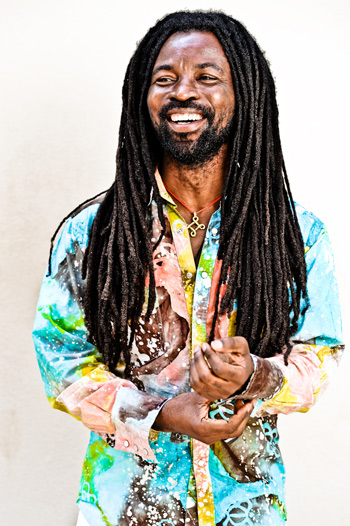 Well I think that in the long run, regardless of whether you are in a major deal or not you are still an independent artist. It depends on how hard you work for the art to really bring it forth you know so, I have always believed in that and believed in really quality work and know that the music always has to stand the test of time and really put in the effort to make sure that happens. Cumbancha, Jacob Edgar who runs Cumbancha is such an amazing, fantastic individual and my relationship goes back cause Jacob used to run all the Putumayo stuff so even my first big global hit which was In Ghana was licensed through Putumayo for their Reggae Around The World compilation and throughout the years Putumayo has supported me so when Cumbancha was also established, Cumbancha has become the label too for various big global artists from Idan Raichel of Israel to Refugee All-Stars from Sierra Leone, its one of the premier world music labels that is doing very incredible stuff. So I felt for this album, although all my previous albums have been released on my private label, I felt this was the time to really partner with a very progressive independent that will work closely with me and in tune with me on my pace, to grow and really nurture. This is an album that I feel is for everybody, its reggae, its beyond reggae, its world, its for the world, its something that has to be nurtured and grown and you know within people to really spread its power and sound around the world. I always need the partners that can really understand this vision and also work very hard with me to do that. So already the album is off to a great start its had coverage from BBC to Canadian Broadcasting Corporation to KCRW’s top tune, to Entertainment Weekly, MTV its all of a sudden pushing reggae music to corners traditionally doesn’t get a lot of attention and I feel that it also is heralding a new time, this is a time where when we talk about branches of the same tree, we don’t talk just about only reggae we talk about the whole world. This is an album to that its really revitalizing to the whole world.
Well I think that in the long run, regardless of whether you are in a major deal or not you are still an independent artist. It depends on how hard you work for the art to really bring it forth you know so, I have always believed in that and believed in really quality work and know that the music always has to stand the test of time and really put in the effort to make sure that happens. Cumbancha, Jacob Edgar who runs Cumbancha is such an amazing, fantastic individual and my relationship goes back cause Jacob used to run all the Putumayo stuff so even my first big global hit which was In Ghana was licensed through Putumayo for their Reggae Around The World compilation and throughout the years Putumayo has supported me so when Cumbancha was also established, Cumbancha has become the label too for various big global artists from Idan Raichel of Israel to Refugee All-Stars from Sierra Leone, its one of the premier world music labels that is doing very incredible stuff. So I felt for this album, although all my previous albums have been released on my private label, I felt this was the time to really partner with a very progressive independent that will work closely with me and in tune with me on my pace, to grow and really nurture. This is an album that I feel is for everybody, its reggae, its beyond reggae, its world, its for the world, its something that has to be nurtured and grown and you know within people to really spread its power and sound around the world. I always need the partners that can really understand this vision and also work very hard with me to do that. So already the album is off to a great start its had coverage from BBC to Canadian Broadcasting Corporation to KCRW’s top tune, to Entertainment Weekly, MTV its all of a sudden pushing reggae music to corners traditionally doesn’t get a lot of attention and I feel that it also is heralding a new time, this is a time where when we talk about branches of the same tree, we don’t talk just about only reggae we talk about the whole world. This is an album to that its really revitalizing to the whole world.
Any closing message for the Reggaeville massive?
I also want to thank you Justine and your dedication to reggae music, and I have been in LA to know that it only takes a few people just carrying the cross in this city and constantly against every adversity and you are one of those amazing soldiers that have kept the word out there and also Reggaeville and all the amazing stuff that they are doing to really champion this music, I have had the opportunity of connecting with the team at SummerJam and seeing them in Germany and I am looking forward to the support because we cannot do it alone, we just need the partners and media to help us, its through partners that our music can get out there, so I also appreciate all the support you are giving me, Reggaeville is giving me and all the reggae press out there is giving to all we are doing.
PHOTOS BY MARK BENNINGTON




